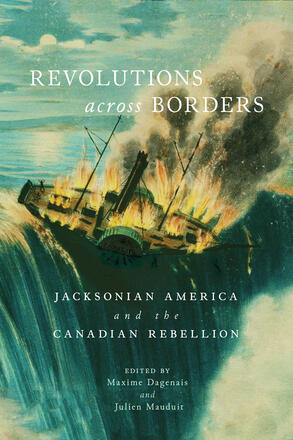
Revolutions across Borders
Jacksonian America and the Canadian Rebellion
A surprising and innovative analysis of the continental dimensions of the Canadian Rebellion of 1837-38.
Description
Starting in 1837, rebels in Upper and Lower Canada revolted against British rule in an attempt to reform a colonial government that they believed was unjust. While this uprising is often perceived as a small-scale, localized event, Revolutions across Borders demonstrates that the Canadian Rebellion of 1837–38 was a major continental crisis with dramatic transnational consequences. In this groundbreaking study, contributors analyze the extent of the Canadian Rebellion beyond British North America and the turbulent Jacksonian period's influence on rebel leaders and the course of the rebellion. Exploring the rebellion's social and economic dimensions, its impact on American politics, policy-making, and the philosophy of manifest destiny, and the significant changes south of the border that influenced this Canadian uprising, the essays in this volume show just how malleable borderland relations were. Chapters investigate how Americans frustrated with the young republic considered an “alternative republic” in Canada, the new monetary system that the rebels planned to establish, how the rebellion played a major role in Martin Van Buren's defeat in the 1840 presidential election, and how America's changing economic alliances doomed the Canadian Rebellion before it even started. Reevaluating the implications of this transnational conflict, Revolutions across Borders brings new life and understanding to this turning point in the history of North America.
Reviews
"Revolutions across Borders makes a powerful argument that borderlands are not only created by state power and material demands, but are also sources of intellectual change. With its attention to people, subjects, and developments in the United States during the 1830s, this volume will compel historians of the early US to think more carefully about the international dimensions of their field. It successfully captures the dynamism and complexity of the Canadian Rebellion as a transnational event." Eric Schlereth, University of Texas at Dallas
"This excellent collection has a contemporary feel to it. While it is clear that Canadian unrest came from resentment of elites, it also speaks of a mood of disillusioned populism in late 1830s America." American Review of Canadian Studies